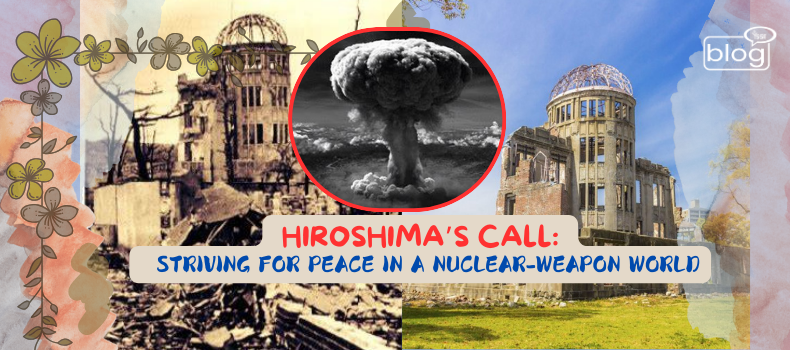Hiroshima! A city still questions mankind’s faults. The destruction it endured haunts humanity. Yet it survived and found the courage to stand as a beacon of hope. It has become a prompt for the whole world of the horrific event that can be caused by nuclear weapons.
It was August 6th, 1945. The world beheld a tragedy created by the atomic bomb, and over 140,000 people lost their existence that year in that city. This city still carries the scars and pain, but it has decided not to follow Newton’s third law in this case. They stand for humanity, spreading the message of peace and a world free of nuclear weapons.
Hiroshima: From Tragedy to Advocacy
Hiroshima has now become the symbol of strength and a leader standing against inhumanity. Nihon Hidankyo, winner of the 2024 Nobel Prize, is a Japanese organization that represents atomic bombing survivors (hibakusha). This organization advocates for a world free from nuclear weapons and also shares testimonies describing the heartbreaking results of nuclear warfare. They are putting in their relentless effort to promote awareness about the emergency call for global denuclearization attempts.
Their work strategy aligns mainly with international campaigns like the Nuclear Weapon Prohibition Treaty. They campaign to enlighten the importance of disarmament of nuclear weapons for global peace and security. They are striving to ensure that these devastating weapons are never used against any life again.
The Peace Memorial Park and Museum of the city remind the world of that tragic event of 1945. Visitors can see here the horrors caused by nuclear war that still affect the people of the city. They can feel the urgency of banning nuclear weapons to protect humanity.
The Global Challenge of Nuclear Weapons
Despite Hiroshima’s effort, do you know what’s going on in the world right now regarding nuclear weapons? Around nine nations claim to have 13,000 nuclear warheads alone. And among them, many are modernizing them to cope with enemy countries. Russia, China, and the U.S. The big three strongest regimes—making excuses of their national security for their enhancing nuclear arsenal. In 2017, a treaty named ‘The Treaty on the Prohibition of Nuclear Weapons (TPNW)’ was adopted. But it’s a very dismaying fact that none of the nuclear-armed nations, including Japan, show their readiness to sign the treaty. This act highlights the gap between political agendas and public sentiment. Shockingly even Japan didn’t care about its public sentiment on that matter.
Hiroshima’s Ongoing Mission
Every year on August 6, Hiroshima holds a Peace Memorial Ceremony to honor the nuclear victims. The youth of the city come forward to support their efforts. ICAN (International Campaign to Abolish Nuclear Weapons) leads many educational programs and initiatives to boost Hiroshima’s message.
They say that trillions of dollars of resources have been spent on nuclear weapons over the years, but they could have been used for the betterment of the world to fight global challenges. Their logical arguments highlight the moral and practical need to reconsider priorities.
A Call to Action
If we want peace, it is possible—the message of Hiroshima is simple and clear. But to achieve a world that is nuclear-free requires collaboration between governments, organizations, and individuals. Fruitful dialogues between nations, advocating for stronger treaties against nuclear arsenals, are not easy steps.
“It is a moral imperative to ensure no one else suffers as we did.” – says Setsuko Thurlow, a hibakusha and Humanitarian. Hiroshima’s story is not just about Japan or its past. It is a call for securing the future, a continuous ringing alarm reminding us not to repeat the mistakes of the past. Let’s not destroy humanity again. Let’s join Hiroshima in their motto and build a world of honor, saving our future and securing morality.
To read more blogs like this, click here.
Writer
Humyara Yeasmin
Intern, Content Writing Department,
YSSE

